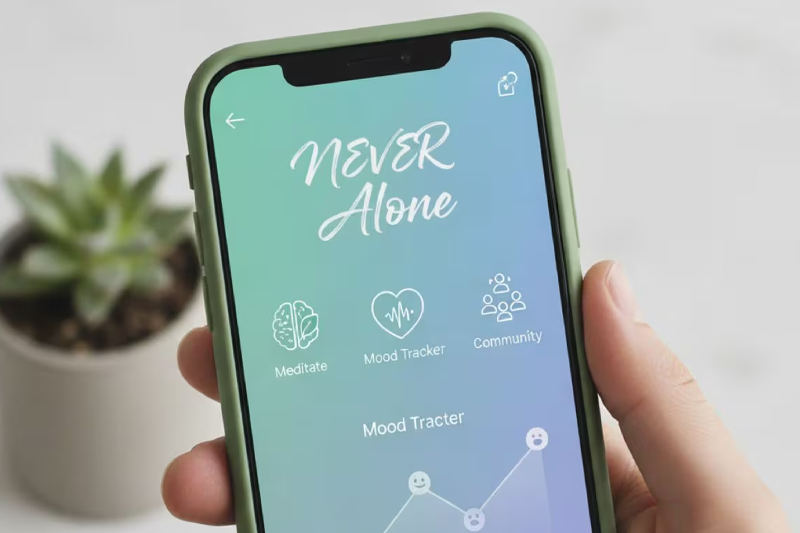
AIIMS Launches AI-Powered “Never Alone” App to Combat Student Suicides and Improve Mental Health
On World Suicide Prevention Day, the All India Institute of Medical Sciences (AIIMS), Delhi, unveiled a groundbreaking initiative aimed at addressing one of the most urgent public health crises—student suicides. The institute launched an Artificial Intelligence-based mental health and wellness app called “Never Alone”, designed to provide early screening, timely interventions, and continuous post-care support for college and university students.
The programme, spearheaded by AIIMS-Delhi’s Department of Psychiatry, also went live at AIIMS-Bhubaneswar and the Institute of Human Behaviour and Allied Sciences (IHBAS), Shahdara. It marks a multi-centre effort to tackle the rising tide of student suicides in India.
A Tech-Enabled Step Towards Mental Wellness
The “Never Alone” app is a web-based, highly secure platform accessible 24/7 through WhatsApp. Students can seek virtual and offline consultations with trained mental health and wellness professionals, ensuring help is always within reach.
According to Dr. Nand Kumar, Professor of Psychiatry at AIIMS-Delhi, the app has been designed to address the screening-to-intervention gap that leaves many students without timely help. “Never Alone” incorporates a three-pronged model:
- Screening for early identification of mental health issues.
- Immediate interventions in crises.
- Post-intervention follow-ups to ensure continuity of care.
Notably, the app provides these services at an extremely low cost—just 70 paisa per student daily. Institutions can subscribe to the programme by approaching AIIMS-Delhi, making it accessible to a vast student population.
Backed by Global Expertise
Thanks to the Global Centre of Integrative Health (GCIH), AIIMS-Delhi will provide this service across all AIIMS centres in India without any financial burden. GCIH is a not-for-profit initiative mentored and supported by Dr. Deepak Chopra, an eminent AIIMS alumnus, author, and pioneer in integrative health.
Dr. Chopra’s involvement ensures that the programme is clinically robust and aligns with holistic and preventive approaches to well-being.
Why the App Matters: The Scale of the Crisis
Suicide is a leading cause of death worldwide and a pressing concern in India. According to the World Health Organization (WHO), one person dies by suicide every 45 seconds globally, with nearly 73% of these deaths occurring in low- and middle-income countries.
In India, the National Crime Records Bureau (NCRB) reported 1,70,924 suicides in 2022—the highest in over five decades. Of these, young adults aged 18–30 accounted for 35%, making them the most affected group, followed closely by the 30–45 age group at 32%.
For students in particular, pressures from academics, competitive exams, financial strain, and personal challenges often create a heavy psychological burden.
Barriers to Seeking Help
Dr. Kumar highlighted a critical challenge: 70–80% of individuals with mental health issues do not seek treatment, often due to stigma and lack of awareness. Alarmingly, suicides continue to occur even in medical colleges, despite the presence of psychiatrists and psychologists on campus.
This treatment gap underscores the need for accessible, stigma-free platforms like “Never Alone” that empower students to seek help discreetly and affordably.
Understanding the Roots of Suicide
While suicide is strongly linked to mental disorders such as depression and alcohol use, many cases are impulsive acts during moments of overwhelming crisis. Stressors may include relationship disputes, financial hardships, chronic illness, or academic pressure.
Dr. Kumar emphasised that suicide prevention requires a public health approach, involving not just treatment but also awareness-building, training more mental health professionals, and creating systems that make help-seeking easier and more acceptable.
Features of the “Never Alone” App
What makes this initiative unique is its AI-enabled framework that integrates technology with clinical expertise:
- Confidential screening tools to identify students at risk.
- Round-the-clock accessibility via WhatsApp.
- Linkage to mental health professionals for both online and offline consultations.
- Follow-up mechanisms to ensure continued care.
- Affordable pricing model to reduce financial barriers.
This blend of technology and personalised human support addresses the gaps that traditional campus counselling often fails to fill.
A Timely Intervention
The launch of “Never Alone” is particularly significant given the rising cases of student suicides linked to competitive exams like NEET, JEE, and UPSC, where aspirants often face crushing academic expectations.
By providing a low-cost, easily accessible, and stigma-free support system, AIIMS is positioning the app as a lifeline for vulnerable students who may otherwise remain silent in their struggles.
A Call for Broader Adoption
Institutions across India are being encouraged to subscribe to the app to safeguard the mental well-being of their students. By doing so, they can integrate a proactive mental health support system into their ecosystem without requiring significant infrastructure investments.
For AIIMS, this project also reflects a broader commitment to integrative health and preventive psychiatry, setting a precedent for how technology can be harnessed to address public health challenges.
Conclusion
The launch of the “Never Alone” app represents a transformative step in student mental health care in India. By merging AI-driven tools with professional counselling, the initiative aims not only to prevent suicides but also to reduce the stigma that keeps many from seeking help.
As Dr. Kumar observed, addressing suicides requires a shift in public health thinking, with a stronger focus on early screening, affordable interventions, and community-wide awareness. With support from global health pioneer Dr. Deepak Chopra and the reach of AIIMS institutions, “Never Alone” could well become a model for suicide prevention programmes worldwide.
In a country where student suicides have become a grim reality, this initiative carries a powerful message: no student should ever feel alone in their struggles.



